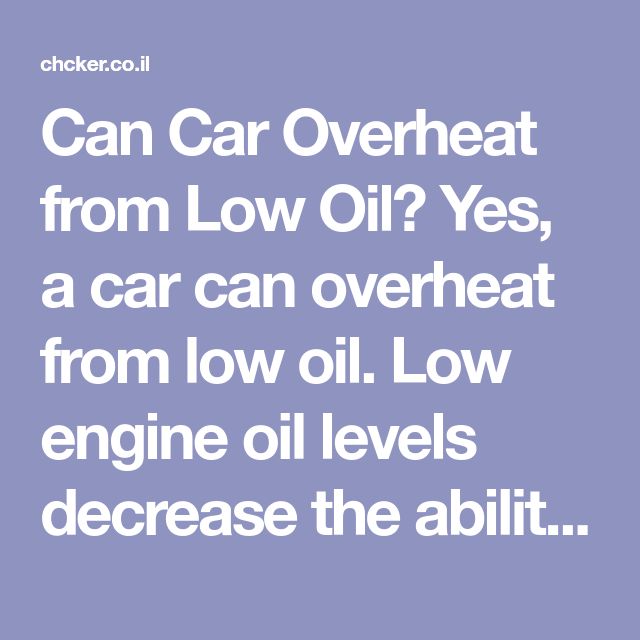When it comes to maintaining a vehicle, there are several factors that can lead to overheating. Among these, the role of engine oil is pivotal and often underestimated. A common query that arises is, “Can low oil make a car overheat?” The answer is not just a simple yes or no; it is a nuanced discussion that intersects with various aspects of vehicle maintenance and understanding the mechanics involved.
Engine oil serves a multifaceted purpose in a car’s engine system. Its primary function is to lubricate the moving parts, reducing friction that generates heat. However, when the oil level is low, this essential lubrication diminishes, leading to greater friction, and thus, more heat. This cascade of events can culminate in an overheated engine, potentially causing severe damage if not addressed swiftly.
Types of Engine Oil and Their Importance
Before diving deeper into the implications of low oil levels, it’s worth noting that not all engine oil is created equal. There are various types, including conventional, synthetic, and synthetic blend oils. Each type has its unique properties and benefits. Synthetic oils are engineered to provide better lubrication at extreme temperatures, while conventional oils are derived from refined crude oil. Understanding the type of oil your vehicle requires is crucial in preventing overheating stemming from low oil levels.
The viscosity of the oil also plays an important role. Viscosity refers to the thickness or thinness of the oil—the higher the viscosity, the thicker the oil. If the oil is too thick for the engine to circulate effectively, it can lead to insufficient lubrication. Conversely, if the oil is too thin, particularly at high temperatures, it may evaporate or break down, further reducing its effectiveness.
The Mechanisms of Overheating Due to Low Oil
Now, let’s explore how low oil levels can lead directly to engine overheating. When oil levels are not adequate, there is less oil to circulate through the engine components. This leads to several critical issues:
- Increased Friction: The most immediate concern is the increase in friction between the metal parts. When oil is low, parts that are usually bathed in a protective layer face direct contact, leading to high friction and, as a result, elevated temperatures.
- Insufficient Cooling: Engine oil not only lubricates but also helps carry heat away from engine components. Low oil levels hinder this cooling mechanism, further exacerbating the overheating problem.
- Degradation of Engine Components: Prolonged periods of low oil levels subjected to excessive heat can lead to part wear and tear. Components like piston rings, cylinder walls, and bearings can suffer catastrophic damage, leading to expensive repairs.
Symptoms of Low Oil Leading to Overheating
It’s imperative for vehicle owners to be vigilant about their engine’s health. There are several symptoms that can indicate low oil levels:
- Oil Pressure Warning Light: Most vehicles come equipped with a warning light that illuminates if oil pressure drops. Ignoring this light can lead to significant engine problems.
- Unusual Engine Sounds: If the engine begins to produce knocking or grinding sounds, it may be a sign that oil is insufficient for proper lubrication.
- Smoke or Steam from the Hood: If the engine overheating reaches a significant point, it may lead to visible smoke or steam escaping from under the hood, a clear indicator of trouble.
Preventive Measures Against Low Oil and Overheating
Preventing low oil levels is significantly easier than dealing with the aftermath of an overheated engine. Here are some proactive steps that can be taken:
- Regular Oil Checks: It’s advisable to check the oil level regularly, ideally once a month or before long trips. A simple dipstick inspection can make all the difference in extending the life of your engine.
- Oil Changes: Follow the manufacturer’s recommendations for oil changes. Fresh oil not only reduces friction but also dissipates heat more effectively than old, degraded oil.
- Monitor Other Fluids: Ensure that coolant levels are also monitored, as they work synergistically with engine oil to manage temperatures.
In Conclusion
To answer the question, can low oil make a car overheat? Yes, it absolutely can. The interdependence of oil levels and engine health is a crucial aspect of vehicle maintenance, and neglecting it can lead to dire consequences. Regular checks, attentive maintenance, and awareness of your vehicle’s specific needs can ensure that your engine stays healthy and operates within optimal temperature ranges.
Understanding the intricate relationship between engine oil, lubrication, and temperature regulation is essential for any vehicle owner. By staying informed and proactive, you can avoid the catastrophic consequences of an overheating engine, prolong the life of your vehicle, and save on costly repairs.
